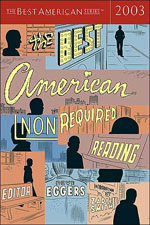...a transcribed discussion of “A Circus at the Center of the World,” by Daniel Alarcón, from The Virginia Quarterly Review...
[The protagonist of this story is Elijah Manau, a thirty-year-old city man who must move to the jungle to embrace his career as a teacher because he scored low on his regional placement exams. The year is 1797. He had been “exiled” to the jungle for six months when soldiers came and changed everything.]
Arianna: I loved the writing. I loved a lot of the images. I liked the end because it added to the complexity of what he was trying to talk about. I really enjoyed the story; it had a good and interesting and important point.
Yael: What do you think was the point? It was so complex.
Arianna: I felt like he [the author] was talking about the transformation of the main character; at the beginning of the story he is one person, and then these other characters have such an effect on him. It was powerful.
Terence: Before he came into the jungle, he just did his work as a normal teacher. I think he originally came in for his family really, and he plans to go back to the city. But then in the end, he slowly tries to fit in more and feels like he might want to stay. It’s a transformation.
[We launch into a discussion about writing style. We all decide this is some of the best writing we've read thus far.]
Arianna: Can we talk about the thing about the “we” [a narrative styling of this piece]. There were two definitions…one that included you [the reader] and one that didn’t. That was so beautiful. With the way it was written, by the end, you can tell [the protagonist] has real respect for his place and the village; that’s a common story, but the way Daniel Alarcón tells it is complex and interesting and well-written.
[Here we talk about Alarcón’s past writings. His works include the novel Lost City Radio, the short-story collection War by Candlelight, and his piece in the ever-famous Best American Nonrequired Reading 2005, with an introduction by Beck]
Nina: I read his short stories and liked them a lot because of the writing. I read a few for class and the one in BANR ’05.
Eli: Like some of his other stories, this story was quite dense [in writing and in theme]. I didn’t know what to make of it, although I enjoyed it.
Josh: It was definitely like you have to be in the right mood to read this. You have to get into it.
Arianna: But I don’t think that takes away from it; in the end, it is dense, but that adds to it.
Sophia: It gave me a good feeling in the end.
Carmen: It felt very green. When I think of it now, I think “green.” I think it was really good about creating a really visual image in your head.
Bora: I had to read it twice because the set-up was a little complex, but the second time I read it, I got really into it.
[We then discuss tackling somewhat hard-to-read pieces and how this factors into "making” our collection. One of the original tasks of the anthology is to introduce writing to a slightly younger readership and maybe to somebody who doesn’t have the same breadth of knowledge of contemporary literature. We are always trying to find stuff that is a few degrees immediately engaging. That “engaging” happens on a formal level and/or a subjective level.]
Arianna: I wonder if you get our book, you trust the whole committee who has put each piece in there. You should! After much considering [during our meetings], there is a reason why everything is in there.
Bora: I think that’s the best thing about the Best American, because it’s nonrequired; it’s such a widespread thing. Of course we’re not going to be a perfect score with every piece for every reader, but as long as we get a majority [of our selections] to reach every reader, we’ve succeeded, you know?
Subscribe to:
Post Comments (Atom)









No comments:
Post a Comment